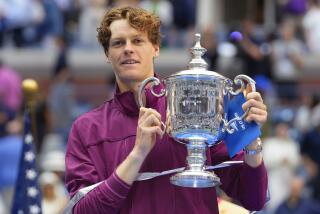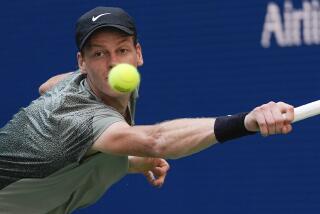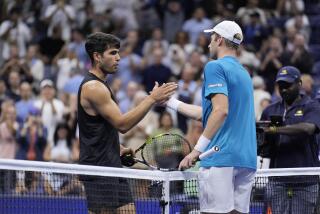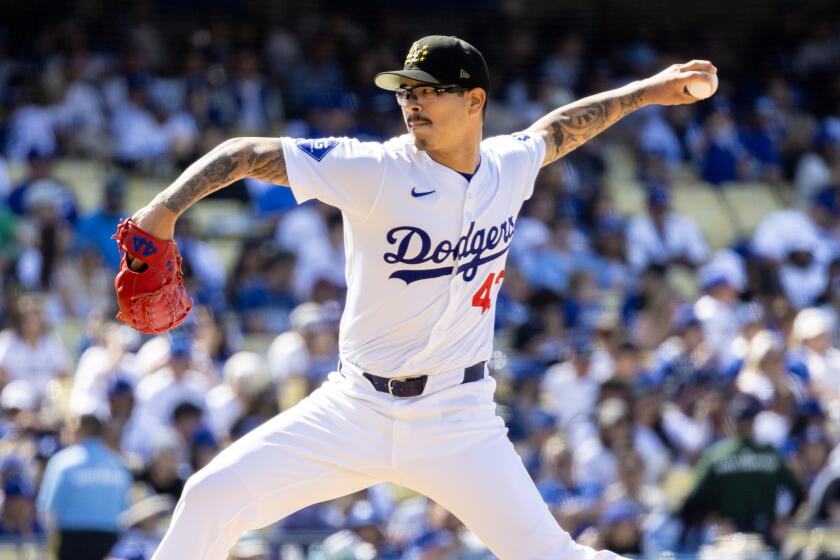Column: For Roger Federer, being ranked the No. 1 tennis player in the world never gets old
The first time Roger Federer gained the top spot in the world rankings, in February 2004, he felt more relieved than euphoric. He had squandered a chance to become No. 1 a few months before that, so the last steps of his ascent were flavored with dashes of regret. The completion of his climb became more like checking off a box on a to-do list than the realization of a dream.
“I felt like, ‘Oh, man, hopefully I’ll still get to world No. 1 one day,’ ” he said, “and then when I finally got it I just felt like, ‘I probably deserve it. Won a lot, played a lot, and won the world tour finals at the end of the year in Houston,’ and so forth, but it just kind of happens.”
He held that spot for 237 consecutive weeks, lost it, got it back, and relinquished it to Novak Djokovic on Nov. 5, 2012. More than five years and one knee surgery later, Federer again became No. 1 last month by advancing past the quarterfinals of the Rotterdam Open on his way to beating Grigor Dimitrov of Bulgaria in the final. After pushing himself through a long rehabilitation process and becoming the oldest World No. 1 in the history of the rankings, at age 36, Federer’s appreciation of his feat was more profound than it was the first time he reached the top of the tennis mountain.
“This one, just the feeling of getting back to world No. 1 is deeper; deeply gratifying because today, when you’re older, you know how much work you’ve put into it,” he said.
Going to Rotterdam specifically to earn the No. 1 ranking and getting it, he said, “felt very different, yes.”
He paused.
“But waking up in the morning,” he added with a smile, “I feel the same like World No. 2 or World No. 17.”
But he’s not No. 2 or No. 17. He’s No. 1 again and has set records for most years between stints at No. 1 (five) and most total weeks at No. 1 (306). It also has been 14 years since his debut at No. 1, another record.
He has compiled an astonishing record of 64-5 with nine titles since he returned from that knee injury and has won three of the last five Grand Slam championships — the Australian Open and Wimbledon in 2017 and the Australian Open again this year — to pad his career total to 20 Slams singles titles. He’s also the defending champion at the BNP Paribas Open, where he will play his first match Saturday against Federico Delbonis of Argentina .
Federer can stay at No. 1 if he reaches the semifinals here, and that’s eminently possible in a field that lacks Rafael Nadal, Andy Murray, Stan Wawrinka and David Goffin because of injuries. Even if they were here, Federer still would have been the favorite.
“He just shows and proves that right now there is no limit, to be honest. Simple as that. He just keeps on proving every tournament that he’s playing,” Dimitrov said. “What else can you say? He’s done it all, and right now he’s just kind of riding that wave. I think all the momentum that he has really helps him out. And the scheduling itself, he plays less tournaments and does well and has more time to rest. So that’s just how it is. He has done so much for the game.”

But Federer believes he has more to do, not only for himself but for the charitable foundation he started 15 years ago to promote education as a means to empower children in southern Africa and his native Switzerland. He participated in an exhibition this week in San Jose with Microsoft founder Bill Gates, TV personality Savannah Guthrie and American player Jack Sock and raised $2.5 million. This was the fourth such event, which has raised a total of $10 million for the foundation.
“Everyone thinks about him as the [greatest of all time] of tennis and everything he does on court but I think he does just as much off the court,” Sock marveled. “It’s really incredible.”
For Federer, a father of four, the foundation’s work has just begun. “But I will spend more and more time as we go forward and hopefully one day get my children involved,” he said.
There will be a day when his life won’t revolve around tennis, “which I’m happy about too,” he said.
When that will be, he doesn’t know. He still feels compelled to excel; to care about every point at every tournament. He insisted he always has something to prove, if to no one but himself.
“You do care about the moments. You do care about the fans, what they think, how they portray you, and you care for the result, you care for so many things,” he said. “As little pressure as there seems to be, there always is on the top guys. You’re always in the center of attention and expectations are there.
“But I’m definitely in a good place. I also feel I have less to prove today and in the past, but that doesn’t mean I don’t want it badly. I need to have that drive to be successful, to be quite honest.”
Follow Helene Elliott on Twitter @helenenothelen
More to Read
Go beyond the scoreboard
Get the latest on L.A.'s teams in the daily Sports Report newsletter.
You may occasionally receive promotional content from the Los Angeles Times.










